Some Jazz Records: Barre Phillips Clippings (Solo Bass Special - In Memoriam)
Comments on recordings from musicians and other actors of the jazz scene. Random and not-so-random listening cues from the archives.
Bass great Barre Phillips’s passing on December 28, 2024 has been announced by the International Society of Bassists. Born on October 27, 1934, Phillips was 90. One of the inescapable facts of any Barre Phillips write-up is his recording of the very first fully solo bass album in November 1968. Throughout his long career, roughly every ten years, Phillips added new entries to what became a running series of unaccompanied albums. With the release of live dates and retitled reissues, this solo discography has grown beyond immediate legibility. Phillips outlined the titles that he considered as parts of his core series in an interview with bass magazine No Treble. These are the titles discussed below.
Barre Phillips, Journal Violone, Opus One number 2, 1969, LP.
"Max Schubel, a contemporary music composer, and I knew each other from New York, and had recorded one piece of music already in New York [Quashed Culch]," Barre Phillips recalled in an extensive 1984 Coda interview with Bill Smith. "He came to London to record a second piece, which we did, which is a very interesting record [Son of Quashed Culch], and he wanted me to make source material for him to take into an electronic studio and compose with. Just bass sounds. So we rented an engineer, a couple of Revoxes and went into a church and played for three hours and at the end of the playing he said, 'I can’t possibly chop that up and use it for source sound; I’ll find something else but I’d love to make a record of that.' Because he had a small record company, Opus One. After much hesitation and hair-pulling and soul-searching I agreed to it and we edited it all up and there you are. That was a very strong moment for me, because basically I was playing everything I could think of to play, from all this stuff I’d been doing for years and years on the bass. It was kind of a catalogue. But I did sometimes get carried away and just play. It wasn’t like playing a concert, the object was to produce source material." Asked by Andrey Henkin about the response to the release, Phillips answered, "Well, I don’t know what the press said if there was any. But the musicians around said this was great, wonderful, love it. But I have no idea what younger musicians would have thought [or] traditional jazz musicians would have thought, but the guys that were around, which at the time was on the English scene, and somewhat the Americans in Paris at the time, they really liked it." The Max Schubel pieces discussed above also appeared on Opus One (catalog numbers 7 and 3, respectively). Journal Violone was on short notice rereleased in France by Gérard Terronès’s Futura Records as Bass Barre and in the UK as Unaccompanied Barre.
Barre Phillips, Call Me When You Get There, ECM 1257, 1984, LP.
"They are not at all the same thing," Barre Phillips said of solo concerts and recordings in a 2000 Coda interview. "Because I can rely on improvisation in a concert. For years now, in terms of playing and a lot of other musical situations, I prefer to improvise. But for a recording, for me the solo thing is, there was this first accident, in the late '60s on the old Opus One record, but since then it is like an update, and it seems to happen every ten years. With the exception of this Opus One record, it is really a prepared event. Call Me When You Get There, I worked on actively for six months. I almost knew every note I was going to play before I went into the studio."
Barre Phillips, Camouflage, Victo cd 08, 1990, CD.
"The Western Front, Camouflage, is a live recording that still happened to fall in the ten-year thing," Barre Phillips told Coda in 2000. This Victo CD was recorded in Vancouver in 1989. "It was definitely representative of what I was doing then. But I think about solo recording because it is time to do it again, time to sit down and put some order in the file index."
Barre Phillips, Journal Violone 9, Émouvance EMV 1015, 2001, CD.
In 2001, Barre Phillips again taped a solo album in-studio. During the necessarily too brief research for this piece, I did not locate instances of Phillips discussing the album. But, for a 2007 feature in the French journal Les Allumés du jazz, Phillips was asked to recommend three albums in his extremely extensive discography: Journal Violone 9 was one of his picks. (As always, Allumés du jazz features are also recommended to non-French readers for their photographic content.)
Barre Phillips, End to End, ECM 2575, 2018, CD.
"This is highly likely going to be the last solo record I will make," Barre Phillips told Ken Weiss during a remarkable interview published by Cadence magazine in 2019. "What I like so much about this record is that, on my behalf, there’s no artifice, it’s just me the way I would be playing and working at home. The bits of artifice which I had brought with me to the studio, I threw out almost instantly and didn’t even record them." Phillips also explained how ECM producer Manfred Eicher composed the entire form of the record during the editing process. "Looking at your solo bass series as a whole, spread across six albums, what is the combined statement that you’ve made with the work," Weiss then asked. "Oh, interesting," Phillips answered. "The combined statement in verbal terms is – 'Hey baby, do your own thing. You gotta do your own thing.' It’s something that I ran into as a performing musician around 1975. This was at a time when The Trio, with John Surman and Stu Martin, had a rebirth and was playing in a town in Switzerland, and I realized what we were doing, and what I had been doing since I said I was going to be a professional musician, was doing my thing in front of people and the people were coming and were supporting me. I was earning a living doing my thing. I mean, what is that all about? [Laughs] For myself, I was giving nothing, the giving part had nothing to do with why I was playing. I became very aware at that time that the jazz business was all about product, but what I’d been doing here as an individual and as a group was more about personal process. We were playing for ourselves. Playing for the public was necessary to earn a living, but it wasn’t why we were playing together. And from that time on, in public performance, I was into improvising. At that time, '75-'76, my solo playing was starting to take off, and I tried to put a message in the music, without using any words, that you would all be better off if you were home making music rather than coming to this concert. The perfect concert for me would have been if nobody was there but they had left notes that said, 'Barre, have a great concert but we can’t come tonight, we’re busy making music.' Socially and politically, I felt a big problem that we are having in our industrial age is that people, in order to earn a living, are having to grab an available job in order to survive and not do something they want to do. If I have anything to say [through my work] it comes in a historical sense where you go back to the mid-'70s, when free improvisation was a pretty small element on the musical horizon. It’s amazingly grown a lot more since then, musically and intellectually, as a mental and reflective way of going about things."
In 2018, Barre Phillips kindly contributed to a feature on Gérard Terronès I wrote for The Wire. It is available online. See also Richard Williams’s tribute to Phillips at The Blue Moment.




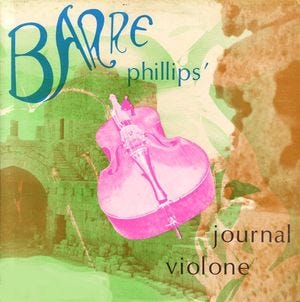
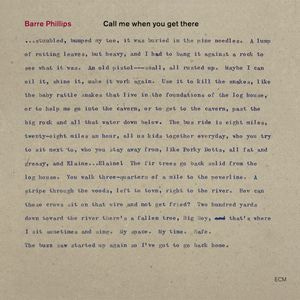
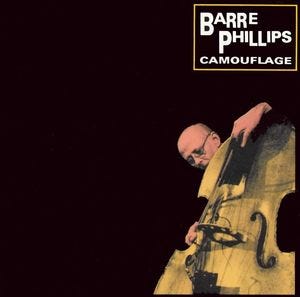
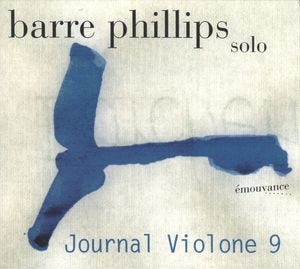
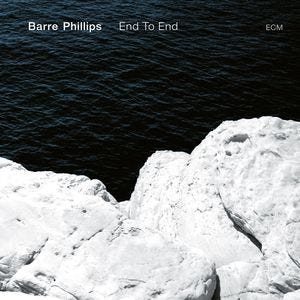
Interesting & terrific